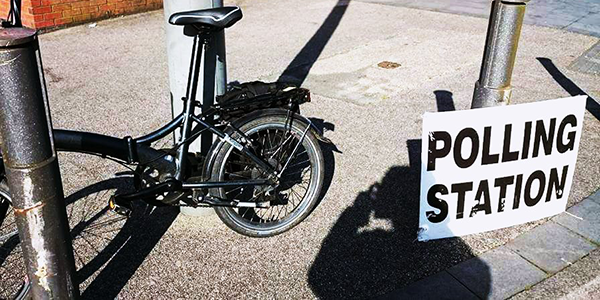It was right to delay England’s local elections, but we must consider the wider impact of Covid-19 on electoral administration
Local and mayoral elections across England have been delayed from May 2020 to May 2021. Postponing them was necessary, writes Alistair Clark, but we must also look at the longer-term impact of Covid-19 on administering elections in the UK and globally to maintain democratic accountability under difficult circumstances.

Picture: Alison Benbow / (CC BY 2.0) licence
As the Covid-19 crisis unfolded, on the afternoon of Friday, 13 March, the UK government finally yielded to sense and agreed to postpone the English local and mayoral elections, including in London, due in May 2020. The move came only after the government had earlier in the day seemed to refuse a request from the Electoral Commission, and also separately from the Association of Electoral Administrators (AEA), for a delay to the polls.
AEA’s letter to the Minister for the Constitution, Chloe Smith MP, cited a range of potential difficulties. These included:
- that potential candidates may not be willing to visit council premises to deliver their nomination papers;
- difficulties in polling stations, from the numbers of voters passing through, to problems recruiting staff;
- worries about the virus being spread via postal votes;
- supply chain difficulties if, for example, ballot paper printers were forced to close because staff had been infected;
- the impact on those running the elections for councils if they were infected.
In support of this, and various other bodies involved in running elections, the Electoral Commission’s letter of 12 March requested a delay until the autumn.
It is worth considering in a little more detail what this might have meant to one key aspect of elections: polling stations. Who was at risk? Obviously voters. Although turnout is low in local elections, around seven million people voted in the 2018 local elections. More than half of these visited polling stations, where they will all have been met by polling station workers.
Poll workers were therefore quite immediately at risk. Who are they? Research I’ve done with Toby James (UEA) in the 2018 and 2019 English local elections has shown that: 24–25% are retired; two-thirds are female; and their average age will be mid-50s. These poll workers are all volunteers. They’re paid, but not a large amount. From their age profile and the number who are retired, many will be in high-risk categories. Many do this work for a little extra money. Whether people would continue to do so under these circumstances is questionable. Councils already find it hard to recruit for a 16-hour, low-pay day. The risk is that many fewer will volunteer to work, making the polls undeliverable in practice. That’s before getting to the problem of putting hundreds of people in close proximity overnight for counts. Moreover, the fact that two-thirds of poll workers are female means there was a gendered aspect to this as well.
The UK government, via the Prime Minister’s spokesman, initially announced that the elections would go ahead. London Mayor, Sadiq Khan, was also reported as having been led to believe that they would run as planned with little risk. In the end, the UK government eventually bowed to the inevitable and postponed the polls. It is unclear both why the request was refused, and why the change was made. Electoral administrators have been treated somewhat cavalierly by the government in recent years, with the 2017 and 2019 ‘snap’ general elections and 2019 European elections all creating various difficulties. Vote Leave staff are now central to the UK government. They have little sympathy for the Electoral Commission.
This was nevertheless likely to be a crisis too far for the electoral system. Chronologically, the postponement decision seemed to happen only after the Labour Party had advised their campaign organisations to stop campaigning. However, even if postponement had been agreed before that, it is likely to be an example of chaotic government communications, something that is becoming a trademark of the current government.
It is important to note that the delay does not unfortunately resolve all issues around running elections in the UK. Local authorities are still having to deliver local by-elections, for instance. Several are planned for the next week, including in Scotland. There currently seems no clear legislative route for those to be delayed.
Implications of the delay
There is some precedent for delay. In 2001, English local elections were postponed for a month because of Foot and Mouth disease. No-one knows how the Covid-19 trajectory will play out in practice. It may be that delaying for a year is the right choice. A year however is a long time, for which no clear justification has been given. There are at least two reasons to think that delay until early autumn, as recommended by the Electoral Commission, was preferable.
The first is political. Local elections are ultimately seen through the prism of national politics. Delay until May 2021 will mean that the Johnson government has effectively an eighteen-month period where it remains untested and unaccountable at the ballot box. With a Conservative government that has enacted major decisions, such as its current handling of the Covid-19 crisis and Brexit, and routinely seeks to avoid being held accountable, this is hardly desirable.
Secondly, delay until May 2021 means that there will be a bumper set of polls taking place at the same time. There will be elections for: Scottish and Welsh parliaments, English councils, police and crime commissioners, London mayor, London assembly, regional mayors and local mayors. While Covid-19 is a clear threat to electoral administration, there is also evidence that holding different levels of polls concurrently is problematic for the quality of elections. My research into British elections suggests that holding different rounds of elections at the same time leads to lower performance, while those councils running only one election demonstrated higher levels of performance. Thus, the additional combination of polls in May 2021 necessitated by the delay will likely lead to further stresses on electoral administrators.
To restate, it may be that delay until May 2021 is the right thing to do. At this juncture this is impossible to know. Depending on Covid-19’s trajectory, an initial delay until early autumn would surely have been preferable. If further delay was necessary until May 2021, this could subsequently be legislated for.
Global impact
More widely, Covid-19 has shown developed democracies the difficulties of running and administering elections under extreme circumstances. Israel’s recent election saw special polling stations set up with polling staff behind protective clothing and with medical staff in attendance. Italy postponed a constitutional referendum due at the end of March. France has gone ahead with the first round of local elections on 15 March, but with polling stations having hand gel and gloves, and the interior minister advising voters to bring their own pens. The second round must be in some doubt.
In the United States, there are already reports that fewer people are volunteering to work at the polls during primaries because of coronavirus fears, something which could have clear implications in the run up to the presidential elections in November. Lines in many polling stations are already long in parts of the US. Fewer poll workers means they’ll be longer still. The impact of the crisis on November’s elections is potentially very serious.
Covid-19 looks set to have profound effects on societies and economies. As one important element of democracy, it is also likely to have an important impact on administering elections. If nothing else, the current crisis underlines the fact that election administration is a crucial part of democratic infrastructure. It needs to be recognised as such more widely. Election administrators across the world will be considering how to adapt to ensure everyone entitled to vote can do so securely and safely. But governments need to support those administrators in doing so, not put them and the many volunteers that elections rely on at unnecessary risk.
This review gives the views of the author, and not the position of Democratic Audit.
About the author

Dr Alistair Clark is Reader in Politics at Newcastle University. He has written widely on electoral integrity and administration, electoral and party politics. He is author of Political Parties in the UK, 2e (Palgrave 2018). He tweets at @ClarkAlistairJ.





 Democratic Audit's core funding is provided by the Joseph Rowntree Charitable Trust. Additional funding is provided by the London School of Economics.
Democratic Audit's core funding is provided by the Joseph Rowntree Charitable Trust. Additional funding is provided by the London School of Economics.